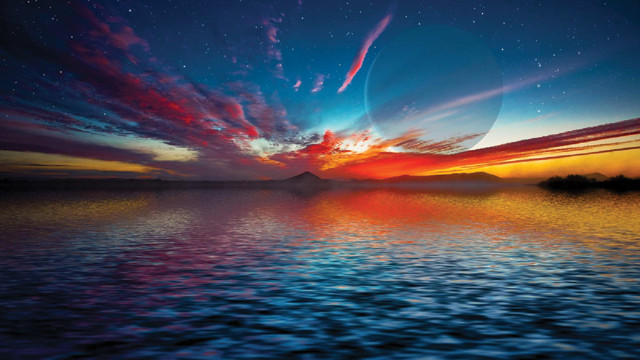
by Julia Rosen Monday, June 1, 2015

An artist's rendition of an exoplanet named Kepler- 186f, the first Earth-sized planet confirmed to orbit within the habitable zone of its star. Credit: David A. Aguilar (CfA).
At last count, the Kepler spacecraft had identified more than 1,000 confirmed exoplanets in the Milky Way Galaxy. Some of these bodies orbit their parent stars in the so-called habitable zone, where liquid water, and thus, life, could survive. But scientists say favorable surface temperatures may not be enough to foster life. Exoplanets also need to generate and maintain liquid water at the surface, raising the question: Do exoplanets have stable oceans?
To find out, Laura Schaefer of the Harvard-Smithsonian Center for Astrophysics and colleagues modeled the geologic water cycle for planets ranging from half to five times the mass of the Earth, with similar compositions and surface temperatures. They calculated how water would move between the surface and the mantle (which on Earth, contains up to 10 times as much water as all of the world’s oceans combined) via subduction and volcanism. These processes are largely driven by the heat of radioactive elements decaying in the mantle. As they decay, the water cycle slows down.
The model predicted that while small planets grew their oceans quickly, they lost them quickly too, as their interiors cooled and plate tectonics slowed to a halt. In contrast, for planets the size of Earth and larger, stable oceans lasted for billions of years, shrinking slightly on medium planets and growing continuously on the largest bodies. However, the most massive planets took up to a billion years to grow their oceans in the first place, delaying the possible development of life.
Therefore, “knowing the age of a planet is just as important to determining its probability of having life as knowing its orbital properties,” Schaefer said at a press conference at the American Astronomical Society meeting in January in Seattle. Armed with this new knowledge, she added, “maybe we can find a planet that’s just right.”
© 2008-2021. All rights reserved. Any copying, redistribution or retransmission of any of the contents of this service without the expressed written permission of the American Geosciences Institute is expressly prohibited. Click here for all copyright requests.